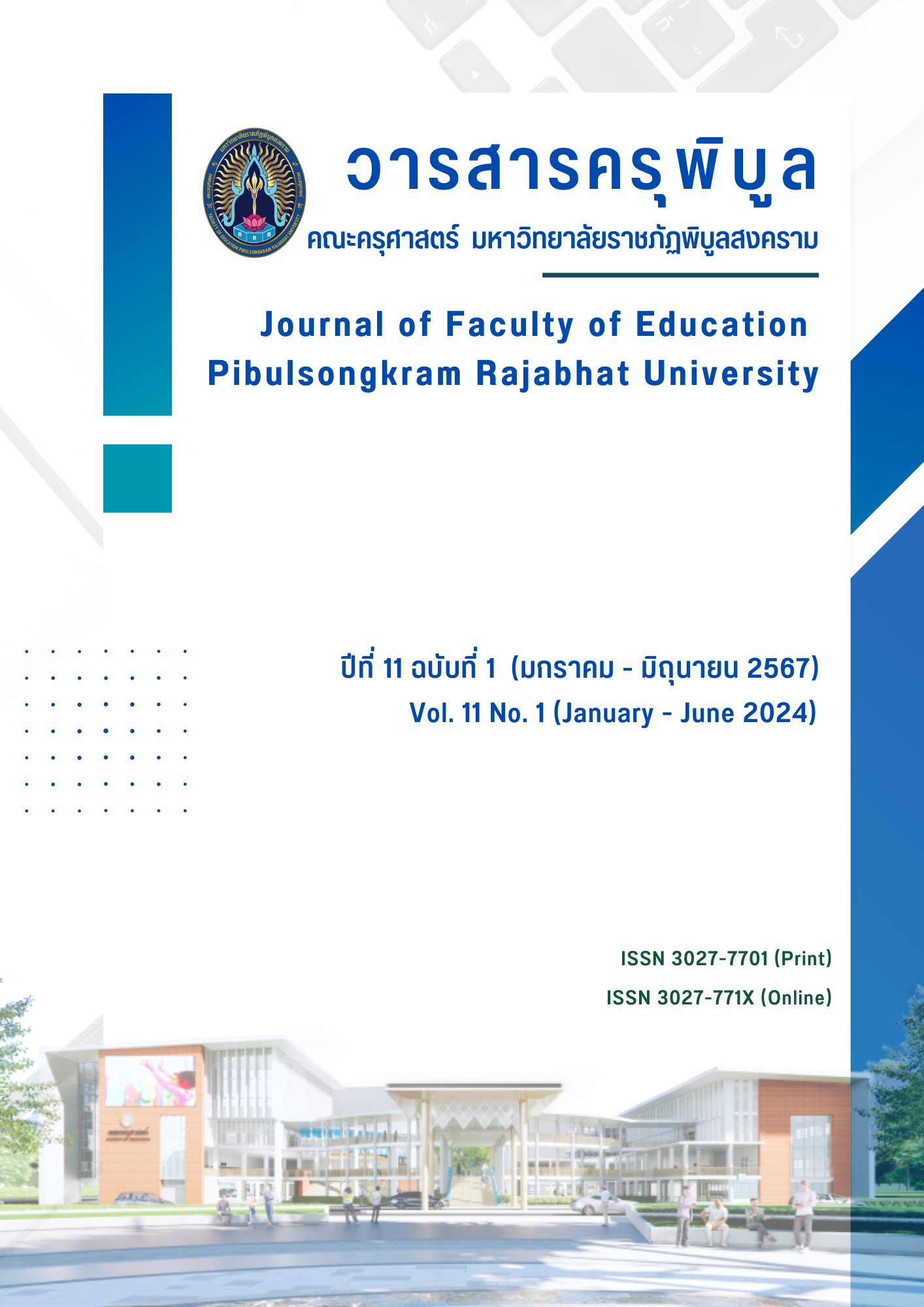STUDY OF NEEDS ASSESSMENT TO PROMOTE DIGITAL COMPETENCY OF STUDENT TEACHERS IN THE FACULTY OF EDUCATION AT PIBULSONGKRAM RAJABHAT UNIVERSITY
Keywords:
Needs Assessment, Digital CompetencyAbstract
This research aimed to study the needs assessment and rank it for promoting digital competency among student teachers in the Faculty of Education at Pibulsongkram Rajabhat University. The sample consisted of 339 student teachers from the Faculty of Education at Pibulsongkram Rajabhat University, selected using a multi-stage random sampling method. The research instrument was a questionnaire based on a 5-point Likert scale, with an index of concordance (IOC) between 0.67 and 1.00, and the reliability of the entire questionnaire, measured using Cronbach’s alpha coefficient, was 0.85. Statistics used for data analysis included mean and standard deviation. Needs were assessed by using the Modified Priority Needs Index () technique, which ranks the importance of needs from highest to lowest.
The research findings revealed that:
1. The overall needs assessment for promoting digital competency among student teachers in the Faculty of Education at Pibulsongkram Rajabhat University was at a moderate level. When each aspect was considered, digital-problem-solving skills using digital tools had the highest average score within the moderate level. The overall desired state of digital competency was at a high level, with digital usage skills having the highest average score within the moderate level.
2. The raking of needs assessment for promoting digital competency among student teachers in the Faculty of Education at Pibulsongkram Rajabhat University from highest to lowest were: (1) digital use, (2) problem-solving with digital tools, (3) digital literacy, respectively.
References
ประกาศกระทรวงศึกษาธิการ เรื่อง มาตรฐานคุณวุฒิระดับปริญญาตรี สาขาครุศาสตร์และสาขาศึกษาศาสตร์ (หลักสูตรสี่ปี) พ.ศ. 2562. (2562, 6 มีนาคม). ราชกิจจานุเบกษา. เล่ม 136 ตอนพิเศษ 56 ง.
พระราชบัญญัติการรักษาความมั่นคงปลอดภัยไซเบอร์ พ.ศ. 2562. (2562, 6 มีนาคม). ราชกิจจานุเบกษา. เล่ม 136 ตอน 69 ก.
พรชนิตว์ ลีนาราช. (2560). ทักษะการรู้ดิจิทัลเพื่อพัฒนาคุณภาพการเรียนรู้. วารสารห้องสมุด, 61(2), 76-92.
มหาวิทยาลัยมหิดล. (2563). มาตรฐานด้านทักษะความเข้าใจและการใช้เทคโนโลยีดิจิทัล (Digital Literacy). https://km.li.mahidol.ac.th/digital-literacy/
วิริยา วิจิตรวาทการ. (2561). (2018, 2 พฤษภาคม). Creating Teacher of Tomorrow. https://www.youtube.com/watch?v=6RM3xGo7tUo
ศยามน อินสะอาด. (2565). สมรรถนะดิจิทัลของผู้สอนในยุคเทคโนโลยีพลิกผัน. วารสารเทคโนโลยีและสื่อสารการศึกษา, 18(1), 1-2.
สำนักงานเลขาธิการสภาการศึกษา. (2562). รายงานการศึกษาแนวปฏิบัติของการสร้างและส่งเสริมการรู้ดิจิทัลสำหรับครู. บริษัท พริกหวานกราฟฟิค จำกัด.
สำนักงานคณะกรรมการการศึกษาขั้นพื้นฐาน. (2563). ประกาศสำนักงานคณะกรรมการการศึกษาขั้นพื้นฐาน เรื่อง นโยบายสำนักงานคณะกรรมการการศึกษาขั้นพื้นฐาน ปีงบประมาณ พ.ศ. 2564-2565.
นงลักษณ์ วิรัชชัย และสุวิมล ว่องวาณิช. (2550). การวิจัยประเมินความต้องการจำเป็น. บริษัท ธรรมดาเพรส จำกัด.
Ribble, M. (2020, January 28). Digital citizenship is more important than ever. https://www.iste.org/explore/digital-citizenship-more-important-ever?articleid=535
UNESCO. (2018). ICT Competency Framework for Teachers. https://unesdoc.unesco.org/ark:/48223/pf0000265721

Downloads
Published
Issue
Section
License
Copyright (c) 2024 คณะครุศาสตร์ มหาวิทยาลัยราชภัฏพิบูลสงคราม

This work is licensed under a Creative Commons Attribution-NonCommercial-NoDerivatives 4.0 International License.
ลิขสิทธิ์เป็นของคณะครุศาสตร์ มหาวิทยาลัยราชภัฏพิบูลสงคราม

